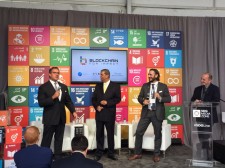Blockchain Commission & Blockchain for Impact Launched at UN to Advance the Sustainable Development Goals

NEW YORK, September 26, 2017 (Newswire.com) - Thursday marked the establishment of the Blockchain Commission for Sustainable Development at the United Nations, in the SDG Media Zone during the 72nd Regular Session of the UN General — and the Commission’s launch of Blockchain for Impact, a collaborative convening and advocacy platform for conscious leadership from all sectors to explore, co-create and promote the application of blockchain technology to initiatives with profound and positive social impact.
The Commission was established to develop a network of global leaders in the blockchain community with a focus on the application of blockchain to initiatives with profound social impact, transparency in the evolving marketplace, trust between multistakeholders, the development of an international policy agenda with a focus on accelerating progress in least developed countries, and the implementation of best practices towards nations' sustainable development targets. With public-private partnerships at the core of its DNA, the Blockchain Commission will serve as a bridge to and aspire to achieve multilateral agreements between and among governments, NGOs and the private sector while advancing the 2030 Agenda for Sustainable Development.
Among our first priorities is to align our efforts and collaborate with the many insightful groups in and around the UN System that are already working to embrace and deploy blockchain in the interest of the common good.
Amir Dossal, Global Partnerships Forum, President & CEO
At the launch event, founders of the Commission — Amir Dossal, President & CEO, Global Partnerships Forum, Sergio Fernandez de Cordova, Chairman, PVBLIC Foundation, Vincent Molinari, Advisor to The Fund for Philanthropy and Efraim Wyeth, Deputy Secretary of the Commission and Executive Director of Blockchain for Impact—assembled a community of high-powered leaders: Founders, CEOs, captains of industry, senior policy-makers, United Nations and World Bank leaders, government representatives, international agencies, academics and other organizations concerned with sustainable development.
Dossal opened the event, declaring a bold vision: "The Blockchain Commission for Sustainable Development envisions and encourages the development of radically creative decentralized solutions to issues including; conservation of natural resources, protection of the commons, empowerment of all communities, financial inclusion and security, public health and welfare, civic trust and protection of the integrity of democratic systems—all in alignment with the Sustainable Development Goals."
The Blockchain Commission for Sustainable Development embraces a range of different perspectives in a multistakeholder approach to promoting transparency, impact, and partnerships. Each year, the Commission will host Blockchain for Impact Summits in several locations around the world, starting at the United Nations in New York. Fernandez de Cordova presented a vision of inclusion and responsibility to the crowd of industry experts: "Blockchain Commission invites visionary industry stakeholders — representing the full breadth of the blockchain ecosystem — into a robust, future-based, multitrack global conversation about social innovation, fair and consistent public policy and responsible guidelines for industry governance."
Blockchain for Impact (BFI) leaders Larry Cummins, CEO of Black Cactus, Ltd and Ryan Gil from NEM kicked off a full slate of content with a lively discussion about Advocacy for Fair Regulation: Balancing Urgency & Caution in Generating a Responsible Framework, moderated by Georgia King, Ideas Director at Quartz. King then invited Ashok Reddy, General Manager of CA and Dan Doney, Co-founder of Securrency to the stage to discuss The Enterprise Challenge: Balancing Privacy & Trust as Blockchain Moves to Scale.
The conversation then shifted to how to connect local and global communities to create profound social impact through innovative applications of blockchain technology in Power of the Network: True, Profound, Sustainable Impact Through Connection, featuring BFI leaders James Jung, Founder of BeSUCCESS, Adil Kassam, CEO of Unify, and Basile Michardière, Founding Partner at MakeSense and hosted by Ben Wilde, Partner at Venture One.
Three innovative applications of blockchain to achieve social impact were then featured in spotlight presentations. Christian Weber, Founder of ShiftPods, announced the formation of The Shelter Coin Foundation, an organization that will support emergency relief efforts through the release of a Shelter Coin. Tomer Dicturel, CEO of Trane AI and Susan Oh, Trane AI’s Blockchain Industry Lead, introduced their platform that accelerates the AI training process through decentralization by engaging crowds to tag, store and model data. And David Kam, Chairman of Mother Earth Trust, announced a November release of the Earth Dollar, a cryptocurrency backed by the conservation of natural resources and designed to reduce poverty worldwide.
Wyeth then invited participants from the standing-room-only audience to make close to a dozen announcements of their own innovative approaches to applying blockchain technology to social impact initiatives aligned with the UN’s Sustainable Development Goals.
The Blockchain Commission for Sustainable Development was established by Global Partnerships Forum, PVBLIC Foundation, and The Fund for Philanthropy in response to the need to develop a framework by which the United Nations and its specialized agencies, member states, intergovernmental organizations, non-governmental organizations, financial institutions and private sector-led organizations can come together to develop global solutions to the most pressing issues of our day.
"Among our first priorities," stated Dossal, "is to align our efforts and collaborate with the many insightful groups in and around the UN System that are already working to embrace and deploy blockchain in the interest of the common good."
Contact:
Efraim Wyeth
Deputy Secretary
Blockchain Commission for Sustainable Development
www.BlockchainCommission.org
Info@blockchaincommission.org
C/O PVBLIC Foundation
777 United Nations Plaza, 5th floor
New York NY 10017
Source: Blockchain Commission
